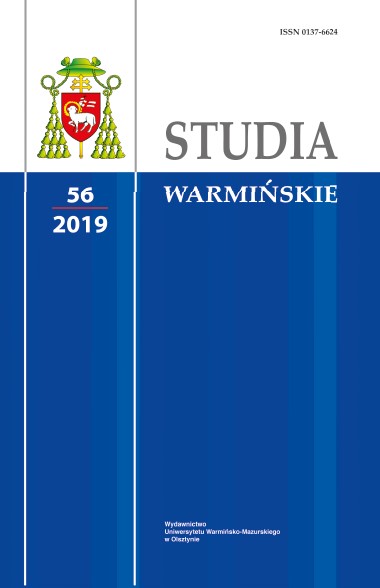Jerozolima w Maran Atha Johanna Gottfrieda Herdera (1779)
Jerusalem in Maran Atha by Johann Gottfried Herder (1779)
Author(s): Marek KarczewskiSubject(s): Christian Theology and Religion, Early Modern Philosophy, Philosophy of Religion, Hermeneutics
Published by: Wydawnictwo Uniwersytetu Warmińsko-Mazurskiego w Olsztynie
Keywords: Johann Gottfried Herder; Maran Atha (1779); biblical exegesis in the Enlightenment; hermeneutics in Rev; Jerusalem in Rev;
Summary/Abstract: The subject of the presented paper is Jerusalem in Maran Atha by Johann Gottfried Herder (1779). J.G. Herder (1744–1803) is one of the outstanding figures of our region. The contemporary academic discussion concerning his achievements and significance predominantly consists of studies related to his work as a philosopher, cultural anthropologist, linguist and theologian. Herder‘s less known works include a commentary to the Revelation of St. John, Maran Atha. Das Buch von der Zukunft der Herrn, des Neuen Testaments Siegel, published in Riga in 1779. An important feature of the commentary is his interpretation of a series of texts from the Revelation as a harbinger of the events of the Jewish war (66–70), with a particular emphasis on circumstances accompanying the fall of Jerusalem in 70. Herder used this thought to interpret Rev 12-19, claiming that the apocalyptic Babylon is actually not Rome, but sinful Jerusalem. On the other hand, Herder points to the specific, prophetic nature of the language used in the Revelation. For Herder, the New Jerusalem, symbolising the community of the redeemed, provides an antithesis of the fallen Jerusalem. The fulfillment of the prophecy concerning the fall of Jerusalem during the battles with the Romans was aimed at strengthening the faith of Christian followers in their anticipation of the Parousia. The paper presents Herder’s reasons underlying his original interpretation of the Revelation. It briefly presents Revelation texts which, according to the author, referred to the stage preceding the destruction of Jerusalem, its downfall and revival in the symbolic heavenly Jerusalem. It also quotes responses of Herder’s contemporaries analysing the publication of Maran Atha, and questions the significance of Herder’s views in the perspective of modern exegetical research on the Revelation. The content of the paper provides a contribution to further, detailed source studies on the original Biblical hermeneutics of this author.
Journal: Studia Warmińskie
- Issue Year: 56/2019
- Issue No: 56
- Page Range: 179-194
- Page Count: 16
- Language: Polish

